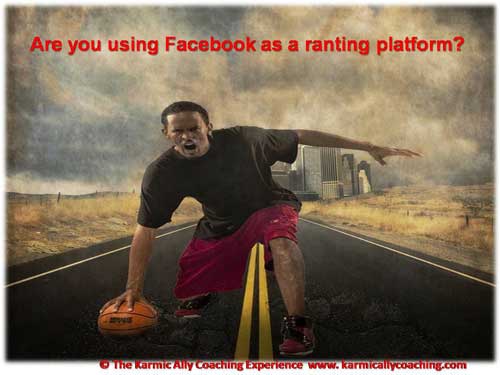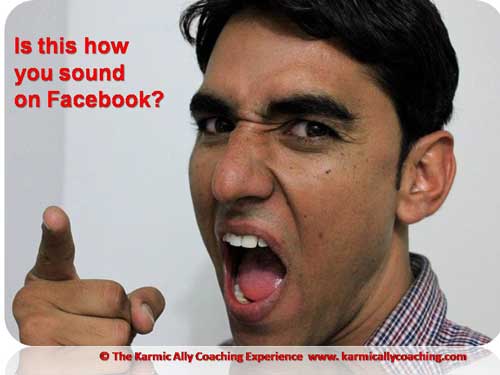This post has already been read 2991 times!
2 years ago, I wrote my first post on Facebook etiquette mentioning the action of unfriending in “The tale of Friends turning Fiends on a Facebook Wall invasion and tips to tackle it”. At the time, my suggestions included blocking fiendish friends from posting on your Wall.
My question to you, has someone, who is supposed to be a friend gotten your goat on Facebook with their comments or actions? Or made you angry or irritated enough to consider unfriending them?

Unfriending a person is an aggressive step that can precipitate hissy fights and offline conflicts.
That may not be your goal. Fortunately, there are passive methods to achieve the same effect but that then comes down to how Facebook savvy you, the offended party are. You can Unfollow, Restrict Access or even just Hide the post from your news feed.
True stories of how real people got unfriended on Facebook
I’ve seen some instances personally that left me wondering if the individual in question was using Facebook as free therapy at the cost of others.
There was this lady who raved and ranted about care giving for her octogenarian mother in one Group and initially got a lot of support and advice on how to cope. That was until each of her posts were a rant and people started to ignore her.
I’m not sure how that one finally played out. I left that Group a few months later while sorting out my own Facebook activity to tighten my news feed.
I met up with her again in another Group about 3 years later. Nothing had changed except that now she was bashing the moderator, criticizing, rabble rousing and generally complaining. This time she brought along a pal who encouraged her. She and pal were soon thrown out of the Group.
The Sad Selfie for comment takes the cake.
Then another time, someone flooded the news feed with tons of photos of themselves passing of sulking pouts as selfies with enigmatic comments. This prompted everyone to ask if everything was okay and lots of comments from friends telling them that they were looking good. Tons of other examples, but I digress.
Reputation and professional management seem to go out of the window and sooner or later alienation of friends is bound to set in. Definitely these are cases for a discreet Unfollow or Hide on your newsfeed to maintain the status quo. But sometimes, there is a strong case for a cold cut Unfriend.
A penchant to rant for attention on Facebook?
Some people not only rave and rant on their Facebook Wall posts but then go on to Group postings and then check and invade other walls to get traction by posting on completely unrelated updates. Some of these rants may be political in nature. Others may become very personal or disrespectful for another person and an unfriending is imminent.
When something like this happens to me, I try personal messaging to get to the root of the matter. If the matter is not resolved then I ask myself 4 pertinent questions before taking action.
- How important is the matter to me?
- Is what I’m thinking and feeling appropriate?
- Can the situation be modified?
- Is taking action worth it?
If an unfriending is in order, then so be it. If someone wants to behave in a manner that is not acceptable to me, then I bless and let go.
When we are upset or needing support, it is normal to reach out and get community support, but a constant barrage or turning nasty is a numero uno reason to be taken off the list.
Are you a potential prospect for an Unfriend action?
To flip the coin on the other side how well are you managing your image and reputation on Facebook?
I shared my take on 8 ways one can actually create the wrong impression while engaging on Facebook in my post How to alienate people & ruin your reputation on Facebook.
If you are or have unintentionally conducted yourself on Facebook in any of the ways in that post, then perhaps it is time to reflect and course correct.
9 more ways to get unfriended on Facebook
In addition to the rant factor, there are some other very good reasons why someone may unfriend you. If you want to lose friends and alienate your online buddies then go ahead and apply one or all. The results are amazing. With a bit of luck, you might just get reported or blocked on Facebook.

This list is in no particular order – just wrote it as the thoughts came to my mind.
#1 If a friend deletes or un-tags himself from a photo or post, repost it and keep reposting.
#2 If you like a Group, then add a friend to it without their permission, not just once but in a whole spate of new Groups. If you are starting a Group, don’t bother asking, just add them and see how irritated they get. If the friendship is important to you, consider inviting them instead.
#3 Ignore offline social rules to your Facebook interactions and make them uncomfortable.
#4 Confront your friend using a public component of Facebook.
#5 Hijack a Wall post with some inane litany about world hunger or social evils so that you can keep your Wall and image clean and then do an open debate until one of you is exhausted.
#6 If someone does not respond to your message within a nano-second, then get hyper and go ballistic on their Wall. (It doesn’t matter that they have a life outside of the virtual world, are off-line and may not jump up every time their blackberry or smart phone says there is a post)
#7 Likewise, if you are ignoring a message on Facebook, then please do show evidence that you are otherwise active online!
#8 Throw common sense to the wind and post stuff that can hurt your friend’s image, relationships and even career. Hey it is virtual world, isn’t it? So what if your friends and friends and the whole public part of cyberspace is now onto it.
#9 Now that you are friends with your friends on Facebook, you can stop communicating with them using methods other than Facebook. A good example is wishing them on their birthday or anniversary. The offline relationship may wither but you have just saved yourself the cost of a phone call or even present.
So that is my list of ways to get the coveted unfriending which gives you permission to engage in more bad behavior because you have every right to upset your friends.
It might, however, be a better idea to make sure that you are not engaging in such actions in the first place. It takes years to cultivate a friendship or relationship but one misstep and it is all gone in a minute.
Have you noticed any other unfriend worthy behavior on Facebook?
How did you tackle it? Please do share in the comments box below.
Additional Resources on Facebook Etiquette
Here’s my list of curated resources on the topic to make sure we stay social!
Official Facebook Etiquette – please visit their Help Center
Essential Facebook Etiquette: 10 Dos And Don’ts
How to alienate people & ruin your reputation on Facebook
The tale of Friends turning Fiends on a Facebook Wall invasion and tips to tackle it
Crack the Code to Your Professional Brand
Updated for relevance February 2024.
Written By: Vatsala Shukla



 I adhere to the Certified Coaches Alliance Code of Ethics and Standards. A copy is available on request.
I adhere to the Certified Coaches Alliance Code of Ethics and Standards. A copy is available on request.
 Let's Talk through the Connect Form:
Let's Talk through the Connect Form:
Don’t think I ever had to unfriend someone on Facebook but many times had to hide posts from people that were negative all the time or complaining excessively about things noone has control over.
Thanks for your great tips, Vatsala!
Always welcome, Delia. I tend to hide negative posts too. Recently, I’ve started to selectively hide posts that were appearing in my news stream because a friend had liked a Page or post but which was not relevant to me. Checking and updating our security and privacy options every now and then also helps. Thanks for visiting the blog.
This brought up a recent situation with one man who continued to post contrary comments on every post I posted. At first I went head to head with him, in a very kind and gentle way because generally that is what I do, until I realized I could either delete his comments or not respond to them at all. I chose to stop responding to the ridiculous and sometimes nonsensical unrelated comments and lately he just doesn’t comment anymore.
I’ve rarely had to un-friend someone and I find I am uber sensitive to what I say and post anywhere. My goal is to be compassionate and kind, and I treat FB the same way I would any place I show up in life. The groups I am in are generally amazing and caring people, which from what I am reading here, is a blessing. I’ve rarely run into the rude or aggressive ranters, but do know they are out there. Thanks for the great post and the possible solutions to some of the inherent issues the online world can bring.
The choice of not responding and letting the irritant get the message and stop is a gracious way to handle the situation but requires a lot of patience. Hats off to you, Beverley for doing that!
Since the time I joined Facebook, I’ve become wiser about the Groups that I join and the Pages that I like and thankfully have met some amazing people whom I would love to invite out for tea if only we were all in the same country. I’m glad you liked the post. The intention of providing solutions to potential dilemmas has been achieved. 🙂
There are a few of my friends on FB that get on my nerves with the cryptic posts that invite you to always ask, “are you ok?”, “What’s wrong?” I tend to ignore them unless I truly think that the friend really needs support from me. I do like your list of passive ways to not see the irritating posts 🙂 Great post!
That is a wonderful way of handling posts by relying on your own judgement to determine when you need to step in to support the friend, Terri. The passive way of handling the situation ensures that the status quo is maintained. I prefer to keep my friends too. 🙂
Fortunately never had to unfriend, nor was I unfriended. I think problems come up in groups. Some people don’t follow rules or play fair. If an admin ignores that, a recourse is often in the group feed and that leads to upsets. I have written constructive comments in a group and they were perceived as attacks. I now use my time more constructively.
Group dynamics in a virtual space are going to be different from those in a live in person event and the moderator/facilitator needs to be alert. Another challenging aspect is the time differences between different members posting their comments. In such a situation, setting up Group rules is a good way to keep members in line. I’ve seen it done in a couple of Groups and the interactions are professional and supportive. Yet, at the end of the day it comes down to maintaining the same level of etiquette that we do in offline interactions. Thanks for sharing your observation, Roslyn.